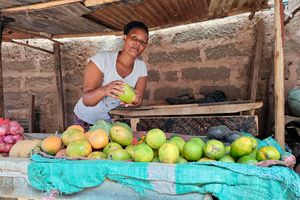
Members of the public queue at the Department of Immigration Services Passport control office at Nyayo House in Nairobi. Inset: Kenyan ID cards, a passport, and birth certificates.
Stateless persons that have been living in the country for the last seven years could become Kenyan citizens if MPs adopt a legislative proposal currently under consideration by a parliamentary committee.
The Kenya Citizenship and Immigration (Amendment) Bill, 2025 seeks to amend the Kenya Citizenship and Immigration Act, Cap. 170 to remove the time limit for application for citizenship by stateless persons.
The proposed legislation by Kilifi North MP Owen Baya is currently under consideration by the National Assembly committee on administration and national security.
“A stateless person who has habitual residence in Kenya for a continuous period of not less than seven years shall be deemed to have been lawfully resident and may on application in the prescribed manner be eligible to be registered as a citizen of Kenya,” reads the proposed legislation.
The proposal has, however, maintained the conditions set out in the principal Act for such persons to be fully recognized as Kenyans.
The conditions include that such a person must be able to understand and communicate in Kiswahili, a local dialect or other communication formats and technologies available to persons with disabilities.
The person must also have not been convicted of an offence and sentenced to imprisonment for a term of three years or longer, intends upon registration as a citizen to continue to permanently reside in Kenya or maintain close association with Kenya.
Appearing before the committee to defend the Bill, Mr Baya said it is unfair to keep calling people who have stayed in the country since independence as stateless.
“There are people who don’t know any other place than Kenya as home. We don’t want to continue keeping these people among us yet they cannot even get an ID,” Mr Baya said.
If approved, children born of the stateless persons will also be registered as Kenyans.
“A child born to stateless parents has the right to be registered in the Register of births immediately after birth in accordance with the Births and Registration Act (cap 149),” reads the proposal.
In Kenya, communities such as Shona, Pemba and Makonde have remained stateless despite history showing that they arrived in the country in the 1800s during the precolonial period.
The current Act requires that for a person to apply to be recognized as a Kenyan citizen, must have been lawfully a resident a resident of Kenya since December 12, 1963
Mr Baya, however, said such people no longer exist saying majority of them have died and it’s their children who are around.
Acquisition of citizenship
While the Constitution does not make provisions for the acquisition of citizenship by stateless persons, it empowers Parliament under Article 18 to make legislation prescribing procedures by which a person may become a citizen and giving effect to the provision of the Chapter on citizenship.
Article 13(2) of the Constitution recognizes two ways in which a person may acquire citizenship of Kenya. That is by birth or by registration.
Articles 14 and 15 prescribe how a person may acquire citizenship by birth and by registration respectively. Under Article 14 (1), a person is a citizen by birth if on the day of the person’s birth, whether or not the person is born in Kenya, either the mother or father of the person is a citizen.
Under Article 15 (1), a person who has been married to a citizen for a period of at least seven years is entitled on application to be registered as a citizen.
Further under Article 15(2), a person who has been lawfully resident in Kenya for a continuous period of at least seven years, and who satisfies the conditions prescribed by an Act of Parliament, may apply to be registered as a citizen.
Internationally, statelessness is governed by the 1954 Convention relating to the Status of Stateless Persons and the 1961 Convention on the Reduction of Statelessness.
The 1954 Convention defines a stateless person as a person who is not considered as a national by any State under the operation of its law.
The 1961 Convention provides guidelines on how contracting states can grant citizenship. It requires contracting states to grant its nationality to a person born in its territory who would otherwise be stateless, either at birth, by operation of law, or upon an application being lodged with the appropriate authority.
It further provides for the conditions which contracting states may impose before granting citizenship to stateless persons.
These include guidelines on the period within which the application may be made, habitual residence, prior convictions and requirements for one have always been stateless.
The Convention further requires that a child born in wedlock in the territory of a Contracting State, whose mother has the nationality of that State, to acquire at birth that nationality
However, Kenya is not a signatory to the two treaties as such acquisition of citizenship by stateless people is governed by national law.





